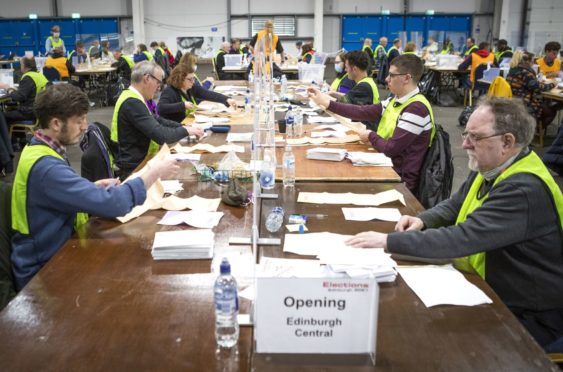Sir, – Scottish people love Scotland and love living in Scotland.
The Scottish culture, heritage and traditions are what bond true Scots together.
Surely then we want to see our great country prosper and flourish in our lifetime here, and May 6 is when each of us can make a difference.
A politician we all know, recently said “Scotland has not failed; its leadership has failed”, and whether we like that or not, it has.
But not only in the last few weeks. The track record on the Scottish economy is not good.
It has long been lagging behind the UK economy but now the prediction must be considered as dreadful.
In 2019 Scotland’s GDP was 8% lower the UK’s as a whole.
We know that between 2000 and 2019, while GDP in the UK grew at a rate of 1.7%, in Scotland it grew at a much smaller 1.3%.
Employment in the same period grew at 0.9% in the UK as a whole, but only at 0.6% in Scotland.
Realistically then, any vote for the SNP is a vote for an independence referendum, which carries with it the horrific thought of the possibility of Scotland being ripped out of the heart of the UK and our already mediocre economy would plummet.
Why put this beautiful country into so much risk?
No political party is perfect, but we simply cannot risk the nationalists dragging Scotland off the road and into the ditch; we have come too far and have too much to cherish to allow that.
David Lindberg.
Fenwick Road,Kilmaurs.
Sign me up for a Scottish passport
Sir, – I want Scotland to be a country in its own right. Not for power or glory but just because it feels right. All of the rest is noise.
Tell me we will be worse off and I won’t believe you.
We couldn’t do worse than the UK which wasted more than our entire budget on a tracing system, and we wouldn’t be buying nuclear bombs so do not tell me lies about being less well off.
We are an awesome people, we will have an awesome country and I want a Scottish passport.
Rab Mungall .
Lady Campbells Court, Dunfermline.
Are you sitting comfortably, PM?
Sir, – Would it not be ironic if, instead of lying, laziness, lack of ethics, ignoring the ministerial code, lack of leadership, cronyism, bungling Covid, and all the rest, it is a few rolls of wallpaper and a three-piece suite, which brings down Prime Minister Johnson.
Les Mackay.
Carmichael Gardens, Dundee.
Do SNP want to close the attainment gap?
Sir, – Unbelievably the SNP Scottish Government are still pledging to close the education attainment gap they have failed to close in 14 years of failure.
But do they really want to close it?
The electorate have kept SNP in power for 14 years and is proof positive the existing education attainment gap is working for them.
Allan Thompson.
Bearsden, Glasgow.
Terminally ill need society’s protection
Sir, – It was refreshing to read the compassionate and wise remarks of Pamala McDougall (Courier, April 29) on the subject of assisted dying.
Citing her lifetime of service as a nurse, it was deeply reassuring to hear of her commitment to “assisted living, not assisted dying”.
With a Bill to introduce assisted suicide being widely expected after the forthcoming Scottish Parliament elections, it is important to make the case for more investment in palliative care services, as a far better alternative.
While supporters of assisted suicide may argue for maximum personal autonomy over the circumstances of our death, the reality is that like all vulnerable groups in society, the terminally and seriously ill are those most in need of our protection.
Giving them the option of ending their lives, with the inevitable pressures that would bring, is not something we as a society should support.
Michael Veitch,
CARE for Scotland.
